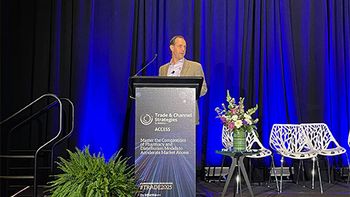
Regulatory Submissions Filed for Opdivo Regimen in Resectable Non-Small Cell Lung Cancer
Phase III CheckMate -77T trial data show statistically significant improvements in event-free survival with Opdivo (nivolumab) plus chemotherapy followed by surgery and adjuvant Opdivo in the treatment of resectable stage IIA to IIIB non-small cell lung cancer.
The FDA has accepted a pair of regulatory submissions for Bristol Myers Squibb’s Opdivo (nivolumab) plus chemotherapy followed by surgery and adjuvant Opdivo in the perioperative treatment of resectable stage IIA to IIIB non-small cell lung cancer (NSCLC).
The supplemental Biologics License Application (sBLA) submissions were based on positive findings from the Phase III CheckMate -77T trial, which produced statistically significant and clinically meaningful improvements in event-free survival (EFS) in patients with resectable NSCLC.1
"Between 30% to 55% of non-small cell lung cancer patients who undergo surgery will experience disease recurrence. We are working to expand options that improve outcomes for patients with resectable disease, as part of our comprehensive approach to the treatment of multiple types of cancer, including and especially in earlier stages,” Abderrahim Oukessou, MD, vice president, thoracic cancers global program lead, Bristol Myers Squibb, said in a press release. “With CheckMate -77T, we have evaluated the potential for neoadjuvant immunotherapy to induce pathological complete response and the role of perioperative Opdivo treatment in reducing the likelihood that the cancer will return and help make extended survival possible for patients. The acceptance of these applications underscores our impactful progress in addressing unmet needs across several non-small cell lung cancer treatment settings and brings us one step closer to offering a new perioperative Opdivo-based regimen to patients who may benefit."1
Opdivo is a monoclonal antibody that binds to the PD-1 receptor and inhibits tumor growth by improving T-cell function.2,3 Opdivo has been approved across an array of indications, both as a single agent and in combination therapy, including for patients with unresectable or metastatic melanoma; metastatic NSCLC; advanced renal cell carcinoma; classical Hodgkin lymphoma; recurrent or metastatic squamous cell carcinoma of the head and neck; locally advanced or metastatic urothelial carcinoma; microsatellite instability-high or mismatch repair deficient metastatic colorectal cancer; and hepatocellular carcinoma.2
The randomized, double-blind, placebo-controlled, multi-center CheckMate -77T trial analyzed neoadjuvant Opdivo plus chemotherapy followed by surgery and adjuvant Opdivo compared with neoadjuvant chemotherapy and placebo followed by surgery and adjuvant placebo. Investigators enrolled 452 patients with resectable stage IIA to IIIB NSCLC. EFS was the primary endpoint of the trial, with secondary endpoints that include overall survival (OS), pathologic complete response (pCR), and major pathologic response (MPR).
Data from CheckMate -77T presented at the European Society of Medical Oncology Congress 2023 show that at a median follow-up of 25.4 months, patients in the Opdivo cohort achieved a 42% decrease in the risk of disease recurrence, progression, or death. For the secondary efficacy endpoints, the Opdivo cohort achieved 25.3% pCR compared with 4.7% in the placebo cohort and 35.4% MPR compared with 12.1% in the placebo cohort.4
The ongoing trial is continuing to assess the secondary endpoint of OS. Definitive surgery rates in the Opdivo cohort were 78% compared with 77% in the placebo cohort. Complete resection was achieved in 89% of patients in the Opdivo cohort compared with 90% in the placebo cohort. In terms of safety, the profile for the Opdivo regimen was consistent with what has previously been reported in trials for NSCLC with no new safety signals identified.
“The results from the CheckMate -77T study add to the evidence supporting the use of Opdivo-based therapies in resectable non-small cell lung cancer and reinvigorate our commitment to treating cancer at earlier stages of the disease in the hopes of helping patients attain durable benefit,” Oukessou, said in a press release. “We are pleased to be presenting research from multiple trials in resectable NSCLC at ESMO, building on our deep scientific understanding of thoracic cancer treatment. We look forward to upcoming discussions with regulatory authorities and hope that we may offer yet another option to patients with non-metastatic NSCLC that could potentially reduce their risk of disease recurrence, progression or death, and lead to better long-term outcomes.”4
The FDA has assigned the sBLA with a Prescription Drug User Fee Act goal action date of October 8, 2024.
References
1. Bristol Myers Squibb Announces Acceptance of U.S. and EU Regulatory Filings for Neoadjuvant Opdivo (nivolumab) and Chemotherapy Followed by Surgery and Adjuvant Opdivo in Resectable Non-Small Cell Lung Cancer. Bristol Myers Squibb. News release. February 7, 2024. Accessed February 7, 2024.
2. Opdivo. Prescribing information. Bristol Myers Squibb; 2021. Accessed February 7, 2024.
3. FDA approves first immunotherapy for initial treatment of gastric cancer [News release].FDA. April 16, 2021. Accessed February 7, 2024.
4. Perioperative Regimen of Neoadjuvant Opdivo (nivolumab) and Chemotherapy Followed by Adjuvant Opdivo Shows Significant Improvement in Event-Free Survival for Patients with Resectable Non-Small Cell Lung Cancer in Phase 3 CheckMate -77T Trial. Bristol Myers Squibb. News release. October 17, 2023. Accessed February 7, 2024.
Newsletter
Stay ahead in the life sciences industry with Pharmaceutical Commerce, the latest news, trends, and strategies in drug distribution, commercialization, and market access.





